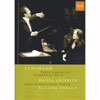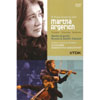Schumann Piano Concerto; Symphony No 4
Schumann evening to savour and double delights for Argerich addicts
View record and artist detailsRecord and Artist Details
Composer or Director: Robert Schumann
Genre:
Orchestral
Label: Euroarts
Magazine Review Date: 7/2007
Media Format: Digital Versatile Disc
Media Runtime: 0
Mastering:
Stereo
Catalogue Number: 2055498

Tracks:
| Composition | Artist Credit |
|---|---|
| Concerto for Piano and Orchestra |
Robert Schumann, Composer
Leipzig Gewandhaus Orchestra Martha Argerich, Piano Riccardo Chailly, Conductor Robert Schumann, Composer |
| Symphony No. 4 |
Robert Schumann, Composer
Leipzig Gewandhaus Orchestra Riccardo Chailly, Conductor Robert Schumann, Composer |
Composer or Director: Sergey Prokofiev, Ludwig van Beethoven, Robert Schumann
Genre:
DVD
Label: TDK
Magazine Review Date: 7/2007
Media Format: Digital Versatile Disc
Media Runtime: 87
Mastering:
Stereo
Catalogue Number: DVWW-COMARG

Tracks:
| Composition | Artist Credit |
|---|---|
| Symphony No. 1, 'Classical' |
Sergey Prokofiev, Composer
Alexandre Rabinovitch, Conductor Flanders Symphony Orchestra Sergey Prokofiev, Composer |
| Concerto for Piano and Orchestra No. 1 |
Sergey Prokofiev, Composer
Alexandre Rabinovitch, Conductor Flanders Symphony Orchestra Martha Argerich, Piano Sergey Prokofiev, Composer |
| Sonata for Violin and Piano No. 1 |
Robert Schumann, Composer
Martha Argerich, Piano Renaud Capuçon, Violin Robert Schumann, Composer |
| Concerto for Violin, Cello, Piano and Orchestra |
Ludwig van Beethoven, Composer
Alexandre Rabinovitch, Conductor Flanders Symphony Orchestra Gautier Capuçon, Cello Ludwig van Beethoven, Composer Martha Argerich, Piano Renaud Capuçon, Violin |
Author: Jeremy Nicholas
The Symphony (it was first heard in its original form in the Gewandhaus) is a further reason for investing, proof of the rapport that Chailly has established as the orchestra’s music director. The icing on the cake is the great Martha Argerich in one of her signature pieces. You will have to go a long way to hear the first movement played as beautifully (credit, too, to the sensual first clarinet). Throughout, her dialogue with the orchestra truly reflects the piano’s role as first among equals. Not to be missed and immeasurably better in every aspect than the 1977 telecast of her in the concerto (VAI, 6/02).
Even greater treats are in store for Argerich addicts with her live concert from the 2005 La Roque d’Anthéron piano festival held en plein air. She is aided and abetted by her erstwhile partner, the eccentric Alexandre Rabinovitch. He may look like a gravedigger from a Gothic novel – and he is certainly the first conductor to sport a battery of kirby grips to keep his locks in place – but what a consummate musician the man is. Having whipped the adequate Flanders orchestra through Prokofiev’s Classical Symphony, everyone hanging on for dear life in the finale, with his talismanic soloist he launches into an account of the same composer’s First Concerto that mesmerises from beginning to end. One readily forgives the occasional rough edge for the sheer high octane thrill of it all. The Capuçon brothers join after the interval when night has fallen, first Renaud in the Schumann Sonata whose sound alone could charm the birds from their perches in the surrounding trees. With Gautier joining in the Triple Concerto, this is a performance that benefits from the close friendship, musical empathy and mutual instincts of the three soloists and their conductor. Frédéric Le Clair’s crisp, lively direction contributes to an all-too-brief evening fully worthy of its preservation on film.
Discover the world's largest classical music catalogue with Presto Music.

Gramophone Digital Club
- Digital Edition
- Digital Archive
- Reviews Database
- Full website access
From £8.75 / month
Subscribe
Gramophone Full Club
- Print Edition
- Digital Edition
- Digital Archive
- Reviews Database
- Full website access
From £11.00 / month
Subscribe
If you are a library, university or other organisation that would be interested in an institutional subscription to Gramophone please click here for further information.




